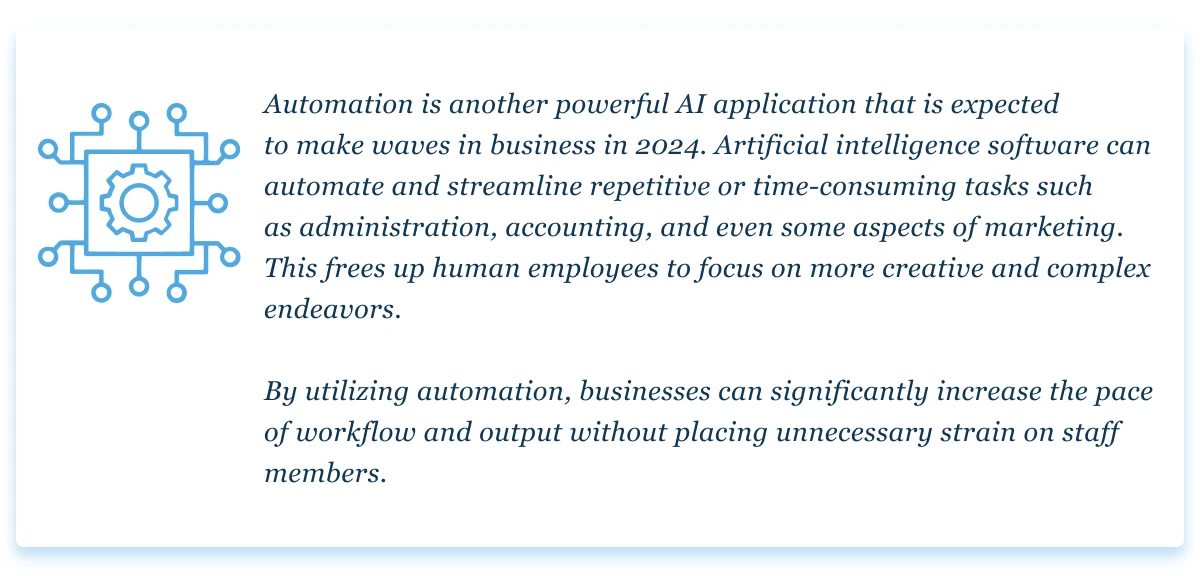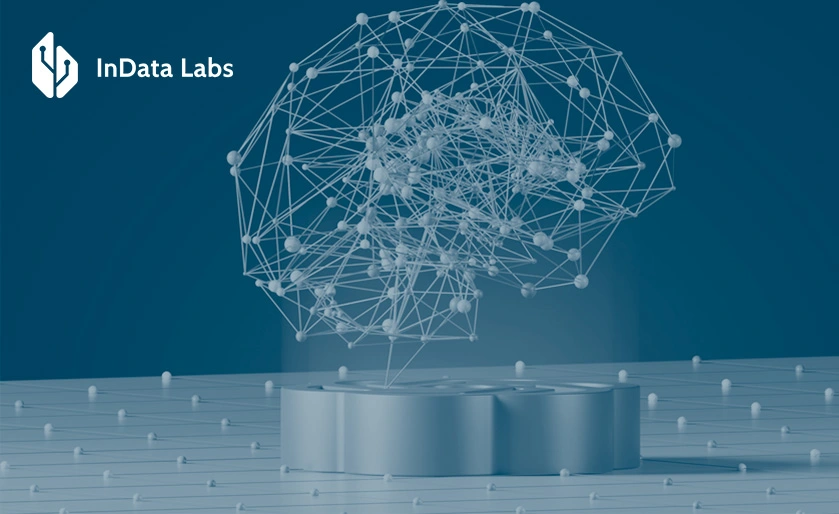When it comes to AI transforming business, this prospect is no longer relegated to the future. There are myriad ways AI is transforming business right now, from the use of artificial intelligence to enhance workflows and efficiency to the use of machine learning (ML) to obtain high-quality data sets for enhanced accessibility and convenience.
Using ML and AI for business transformation has become par for the course for businesses around the world. These technologies are, without a doubt, the future of the digital landscape and business operations. Experts now warn that companies that haven’t yet integrated with AI could fall behind their rivals, and the AI market is expected to reach a value exceeding $500bn in 2024.
Read on to explore the role of artificial intelligence in business transformation and how artificial intelligence will change the future of business and bring about a global digital transformation.
Understanding AI
Before delving into how artificial intelligence is transforming business, it’s important to have a clear understanding of this technology and what it can achieve. Artificial intelligence – AI for short – is a term referring to a wide range of computer software programs capable of engaging in ‘human-like’ tasks and activities. These activities include planning and learning, solving complex problems, and even displaying rudimentary creativity.
However, AI in the context of modern-day business operations needs to be defined in a more specific way. AI can include tools like machine learning. This is one of the most commonly used types of AI for businesses, and it processes vast amounts of data quickly using algorithms capable of ‘learning’ as they work.
Machine learning programs use data to consistently enhance their algorithms and improve the quality of their modeling over time. They are most often used to structure large sums of data obtained through the Internet of Things and connected devices, and extract usable insights which humans can easily consult and gain value from. ML programs are also adept at identifying trends, patterns, and anomalies in data. This assists businesses of all types in optimizing operations, capitalizing on emerging trends, and keeping their workflows running smoothly.

Source: Unsplash
Deep learning is another facet of AI for business use, which relies on neural networks – groups of interconnected AI ‘nodes’ – to achieve non-linear reasoning. Deep learning is essential for more complex applications. Its ability to analyze a vast range of factors at the same time makes it suitable for uses such as fraud detection, supporting the functioning of self-driving vehicles, and more.
Deep learning offers great potential in business contexts. While ML algorithms often experience a plateau in their abilities once they have captured certain amounts of data, deep learning models can exponentially improve their performance and capabilities over time as they receive and process more data. This essentially means that deep learning models have a higher degree of scalability while providing more detailed and nuanced insights and uses for human users.
Artificial intelligence for business transformation: How AI transforms business in 2024
AI’s capabilities are rapidly improving, giving this technology a broad range of applications in the business world. There are many potential uses for AI, ML, and deep learning. For starters, retailers may use AI-powered tools to analyze the purchase data of their customers, identify their most popular products using online ads, and combine this data to streamline their offerings and maximize sales.
Other organizations, such as financial and government institutions, are beginning to use AI to minimize the risk of their consumers experiencing financial theft, data theft, and fraud. They’re using deep learning to identify and alert consumers to suspicious trends in user activity. AI will also increasingly be used to enhance the customer experience, both on land and online, through AI chatbot development and other new technologies. Chatbots are already widely employed to provide instant customer support, and answer frequently asked questions. Concurrently, they gain information about each customer’s needs to enable human operators to provide efficient and personalized assistance.

There are current concerns that AI’s capabilities may force many human workers out of their positions. However, most experts disagree with this sentiment. AI’s implications for human workers are more nuanced. Many believe that instead of replacing jobs, this technology will facilitate the creation of a knowledge-based economy, assisting workers in streamlining their workflows and amplifying productivity in their current roles.
How AI is transforming business intelligence
AI is changing the way that businesses gather intelligence. AI-based cloud platforms can manage vast databases of intelligence and replicate and analyze structured data such as customer information and sales data from a variety of apps, websites, and relational databases. This information can be gathered across numerous points in a business’s operations, from computers and mobile devices to financial transactions, production equipment, and sensors. From there, it is analyzed by AI to identify key trends, patterns and irregularities. The latter of which can be rectified to enhance operations and long-term profitability.
Additionally, artificial intelligence can flag unexpected differences in a business’s operations, notifying relevant parties of important variances that could negatively impact production and sales.
For example, if a factory manager uses AI to monitor their assembly line equipment, the technology can identify slowdowns in production. It can then notify the manager and potentially recommend specific actions and solutions to address these slowdowns, from equipment servicing to parts replacements. Many of these platforms store replicated data on the cloud or on RAM, allowing them to access it in real time to provide rapid decision-making capabilities.
Some AI-based tools also enable businesses to connect multiple native software connectors, allowing them to extract data from third-party apps for the purpose of business intelligence.
Using the example of a retailer, certain platforms can extract data from Shopify, Facebook, Salesforce, and other sales-related applications to provide insights into sales trends, customers, product inventories, and product performances. This data can then be used to generate comprehensive reports and identify sales trends in real time, enabling retailers to make informed decisions around marketing, inventory management, and customer relationship management.
Businesses can even use AI to gain the ability to automate their merchandising processes using extracted business intelligence. Certain tools provide recommendations for actions that organizations can take to boost their sales based on customers’ intentions to buy and each organization’s realization of revenues.

Source: Unsplash
Based on a predictive understanding of a company’s customers, AI tools can combine machine learning and big data to predict which products may appeal to specific customers as they search online. Tools that predict and display related products based on search terms, customer data, or past purchasing histories may enhance sales and allow for the automation of merchandising tasks according to consumer demand and current sales trends.
Which industries is AI changing?
AI is rapidly changing the nature of dozens of industries across the globe. However, a few industries in particular are being particularly transformed by these new technologies.
Automotive
The automotive industry is increasingly using AI-based software to enable the production of self-driving vehicles that can navigate their environments safely using data inputs from vision sensors.

Source: Unsplash
Bioscience
The bioscience industry is using AI to rapidly identify and develop new treatments for conditions and diseases. The industry is relying on data science to predict which compounds may be able to cure specific diseases and enable the development of life-altering medications. The marketing and creative services landscape is using these tools to analyze customer data and craft more effective and engaging campaigns.
Education
In the education industry, AI is enabling faster and more personalized learning plans according to each student’s needs and learning styles. Large language models (LLM) and retrieval augmented generation (or RAG) are also facilitating the creation of customized assisted learning tools, personalized learning experiences, and cross-language communication. This provides better and more accessible education for students and professionals.
Finance & banking
Financial institutions and banks are also using ML and deep learning to analyze chat conversations with customers, identify each customer’s preferences and circumstances, and offer personalized advice and actionable insights.

Source: Unsplash
Healthcare
Even the healthcare industry is on board, with new apps being developed to provide a virtual first point of contact for patients. These apps use AI to provide free medical advice to patients in need or facilitate video consultations with medical professionals. This allows people to access instant, quality medical care without needing to travel.
IoT
Last but not least, the Internet of Things (IoT) is transforming the way people live, work, and navigate their surroundings on a large scale. The IoT provides incredibly vast sums of data, which allows for the development of ‘smart cities’.
These cities use data science and sensors to optimize the operation and safety of urban areas. AI is allowing cities to make smarter and more informed decisions over time, including decisions on how to improve air quality, reduce traffic congestion, and make their streets simpler to navigate.
AI strategies for business transformation: AI to grow your business model
An artificial intelligence strategy for business can be used to enhance and grow many different areas of an organization, streamlining tasks like predictive sales forecasting, administration, customer service, marketing, and cybersecurity. AI-based tools can process large sums of sales data to provide informed insights into future sales forecasts, future sales trends, and marketing efforts. These capabilities enable the making of more strategic decisions regarding marketing and sales, the more effective and efficient use of resources, and planning preemptively for future challenges.
A recent Salesforce study notes that businesses using data for their sales and marketing efforts are more likely to see a return on investment increase of up to 15-20%.
-
Increase productivity
Businesses can use artificial intelligence strategies for leading business transformation to reduce administrative burdens and automate tasks like scheduling, report creation, and data entry to boost productivity.
AI system tools use ML algorithms to learn from data sets and improve the accuracy of their task automation over time while also offering real-time monitoring and alerts for administrative tasks, ensuring that they are completed on time.
-
Improve customer relationships
Integrating AI into your business has great potential for enhancing customer relationship management and even boosting lifetime customer values. A report from Insider Intelligence notes that almost 50% of marketers in the US increased their AI investments in 2022 related to their customer relationship management strategies.
AI offers personalized customer interactions, sentiment analysis tools, and predictive analytics. All of these tools transform customer service and create an optimal customer journey, which in turn can benefit sales and lead conversion rates.
-
Simplify marketing
Generative AI tools may help to make marketing easier, more efficient, and more effective. Such tools can generate compelling visual and written content, create personalized customer interactions, and segment email marketing lists to drive improved customer acquisition rates.
Generative AI development may also provide key insights into customer preferences and behaviors. This allows for the personalization of marketing campaigns while simplifying the tasks of ad placement, social media posting, and email marketing.
-
Enhance security
When it comes to transforming your business with AI, cybersecurity, and customer data security are other essential considerations for modern businesses. And AI management consulting can help.
Cyber attacks and online fraud are becoming more common occurrences in our increasingly interconnected world. Fortunately, certain AI tools can help minimize these risks by using machine learning algorithms to detect fraud and breaches and rapidly respond to potential threats. These platforms analyze vast volumes of data to identify patterns and typical activities, allowing them to spot suspicious activity quickly and notify relevant parties of prospective dangers.
This, in turn, may enable your business to protect its data and the data of its customers while helping to preserve its reputation in its industry or niche.
AI business transformation: In summary
Artificial intelligence, AI consulting, machine learning, and deep learning are rapidly changing the nature of business operations in 2024. Artificial intelligence tools streamline a myriad of different tasks and processes, from customer interactions and marketing to administrative responsibilities, transportation, forecasting, and even cybersecurity.
When it comes to predicting how AI will transform business in the future, it’s important to note that artificial intelligence AI technologies are still in the early phases of AI development. Their capabilities are expected to expand significantly in the future. It’s difficult to say exactly how this technology will develop, but experts are convinced that it will become exponentially more useful in our everyday lives and business operations.
Graphic processing units are also becoming increasingly faster and more advanced. This is set to enhance the applications of AI software across every industry and sector by providing even larger sums of clean data and more rapid processing abilities.
Some predictions on how artificial intelligence will transform business say that AI will transport digital technology from its current on-screen format into the real world. Essentially, this will turn our physical environments into its primary user interfaces. This could enable businesses to design experiences around their customers and workers and allow these target groups to interact with digital overlays in their immediate environments – a feature that could make for even more immersive experiences while still providing a wealth of data for companies across key global and regional sectors.



